|
Back in the early 1980s, a close friend and I started noticing that the name John Landis was appearing on films we found particularly entertaining. It was my friend who first spotted that the oddest link between his blockbuster musical comedy The Blues Brothers and his horror masterpiece An American Werewolf in London was the fake film title, "See You Next Wednesday." In The Blues Brothers it adorns a billboard poster for a King Kong-like monster movie, and in American Werewolf in London it's the title of the porno flick playing at the cinema in which David is confronted by the undead victims of his nocturnal lycanthropic rampages (a poster for which can also be spotted in the scene set in the London Underground). What, we wondered, was this all about? A few weeks later, I got a phone call from my friend informing me that he'd got hold of a VHS tape of Landis's low-budget first feature, Schlock. "And you know that whole 'See you next Wednesday' thing?" he added, "Well it's all over this one." He's not kidding. Up front, it's cited alongside Birth of a Nation, Gone with the Wind, 2001: A Space Odyssey and Love Story as a classic to which Schlock can be compared, and later appears on two movie posters and is playing alongside The Blob and Dinosaurus in a cinema in which one of the film's lengthier scenes is set. It's since been established that those four words are to Landis films what director cameos were to Hitchcock's (Landis even managed to shoehorn them into the two Michael Jackson music videos he directed, Thriller and Black or White) and that the phrase began life as an innocuous line of dialogue in 2001: A Space Odyssey.
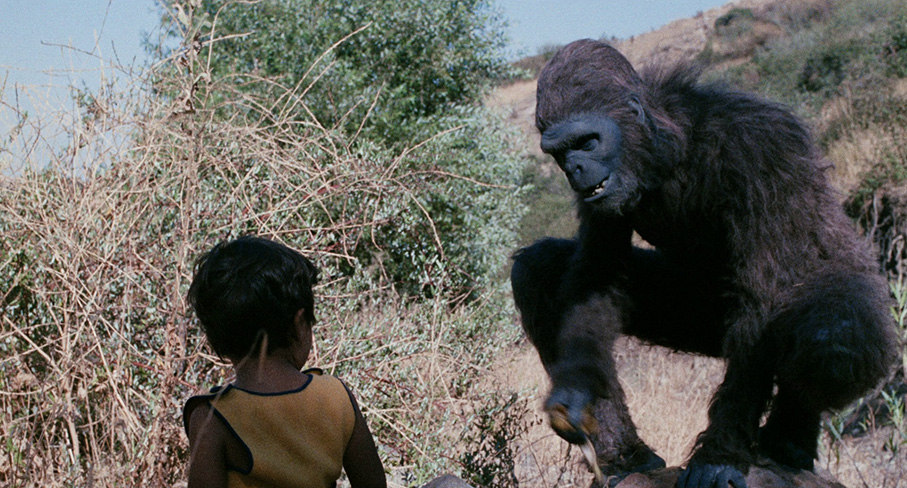
Schlock is one of those films I enjoyed for its inventive silliness in my youth but that doesn't seem quite as inventively silly all these years later. I'll freely admit that what made me laugh in my youth doesn't always prompt the same response in the older and more cynical me I've become, but certain other allowances have to be made here. This was Landis's first feature film, one made on a budget of $61,000, half of which he financed himself from the proceeds of film work he had been doing for some years (I wasn't previously aware that he was an uncredited assistant director on Kelly's Heroes), and he was just 21 years of age at the time. None of which you'll be completely surprised by if you're new to the film. If you think I'm being snootily critical, then know that Landis himself has groaned more than once in the past when the film has been brought up by curious interviewers, and in the commentary on this very disc describes it at one point as "a terrible movie." It's not, not by any means, but depending on the leaning of your sense of humour, you may need to make some sizeable allowances to get the most out of what still makes the film worth seeing and has seen it attract a small but enthusiastic cult following.
The plot has only a passing relevance here, but is probably still worth outlining. In a small American town, local teenagers are being slaughtered in droves, and the scruffy police chief, Detective Sergeant Wino (oh yes), hasn't a clue who or what might be responsible. We soon discover that the hirsute perpetrator is an ape-man known as Schlock who appears to have made a nest in a nearby underground cave. While Wino and his band of buffoonish cops unsuccessfully attempt to track Schlock down, the creature becomes fascinated with young Mindy, who has just been released from hospital following an operation to restore her sight, and now is just waiting for the bandages to be removed.
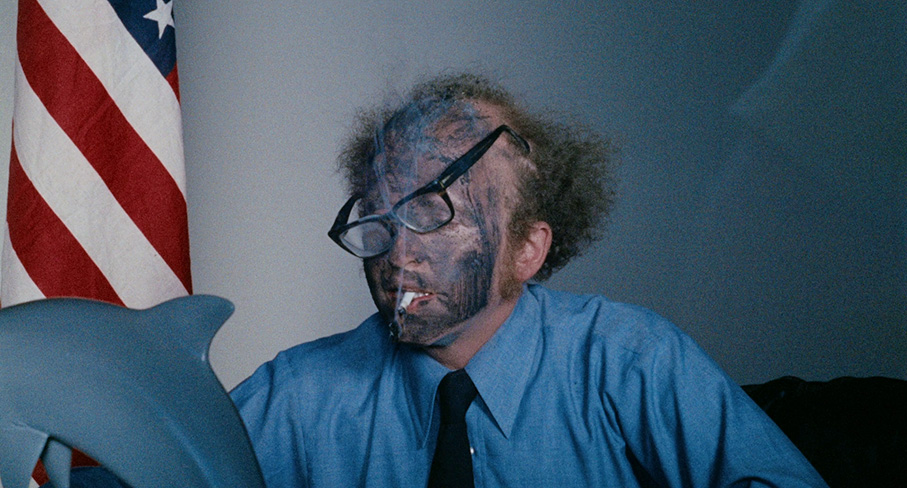
Based on that outline alone, you can probably write some of the stabs at humour that follow yourself. Landis certainly gets as much mileage as he can out the fact that Mindy cannot see where she is going or who she is talking to, and it comes as no surprise that when Schlock approaches her when she's alone in her garden, she's not alarmed because she mistakes him for an affectionate dog. A fair few of the more visual gags, meanwhile, hark all the way back to the basic silent cinema comedy, from the explosive attempt to light a cigarette that blackens the victim's face and sends his hair and glasses askew, to dumbass behaviour and pratfalls that are only a whisker away from having a sad trombone accompaniment. None of this is helped by performances that sometimes betray the fact that many of those in front of the camera weren't actors at all but friends and relatives of Landis and his collaborators. A novice filmmaker's understanding of the importance of pacing, meanwhile, results in nicely-timed gags sitting alongside others that are exhaustingly laboured.
It quickly becomes clear that Landis is not really interested in telling a story but instead using the premise as the basis for a series of thematically linked sketches of wildly varying quality, a concept he would develop more fully in his second feature, The Kentucky Fried Movie, which and handful of the jokes here (notably the "guess the body count" quiz run by the flamboyant reporter at the location of a slaughter that is still being clumsily cleaned up by police) almost anticipate. Yet as you might expect of the man who later delivered An American Werewolf in London, Trading Places and the oft-underrated comedy-drama Into the Night, there are still a fair number of inspired comedy moments. Particularly funny is the decision of have Schlock (played by Landis himself) react to situations more as a curious or irritable human than an ape. My favourite comes after he is almost hit by a car, which sees him haul the driver out of his vehicle, command him to stay put with a sternly pointed finger, then proceed to systematically tear the car apart piece-by-piece, pausing every few seconds to look over at the driver and check that his actions are being acknowledged. Just occasionally, though, even these more effective sequences risk overplaying their hand, as when Mindy mistakes Schlock for a dog and throws a stick for him to retrieve, an action that he wearily responds to, only to have her to throw the stick again (amusing), and again (also amusing), and again (still quite funny), and again (okay, we get it), and again... The dialogue is not exactly inspired but is intermittently still scores a comical bullseye, as in the timing and deadpan delivery of Wino's reaction to the opening playground massacre, or the scientist who describes the passing of ages by telling a reporter that "whole bunches of millions of years went by." I also giggle every time when a still recovering Mindy is asked by her boyfriend how she feels and she confidently replies, "I feel more like I do now than I did when I got here."
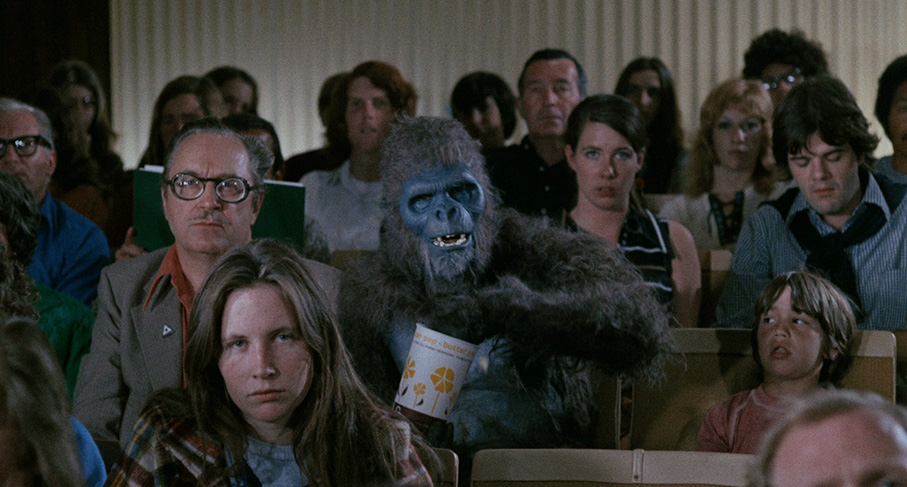
Uneven and often lowbrow it may be, but Schlock is nigh-on impossible to dislike, and it's easy to see why it has developed a bit of a cult following. It radiates that good-natured charm that any half-decent low-budget work made by enthusiastic first-timers seems to have in abundance, and when it does deliver it's clear there is real talent and wit at work here. It's crisply shot by first-time dramatic feature cinematographer Robert E. Collins, and while some scenes really could do with having their fat trimmed, elsewhere there is an understanding of how a gag can be created in the timing of the edit alone that points the way forward for Landis as a filmmaker. And for all its daffiness, the film did indeed prove to be a career launcher for him, as well as a then 20-year-old novice makeup effects artist named Rick Baker, whose Schlock suit was so good that Landis abandoned his original idea of having a deliberately fake-looking creature in favour of one he could develop into a rounded and likeable character (and despite not having a line, Landis the performer pretty much steals the comedy show here). It may not now seem quite as funny as I remember it from my first viewing all those years ago, but it remains an enjoyably daft calling card from a director who would soon go on to great things, and in its best moments it absolutely deserves to be classified as a John Landis film.
A vibrant 4K restoration of a film that looks far better than I would have expected given the budget on which it was shot, but by shooting on 35mm in generally good light and really knowing his stuff, cinematographer Robert E. Collins has ensured that the restoration team had strong material to work with. The contrast is very well balanced, the colour rendition lovely and a fine film grain only really becomes clearly visible on clear blue skies. The image is clean and free of damage throughout.
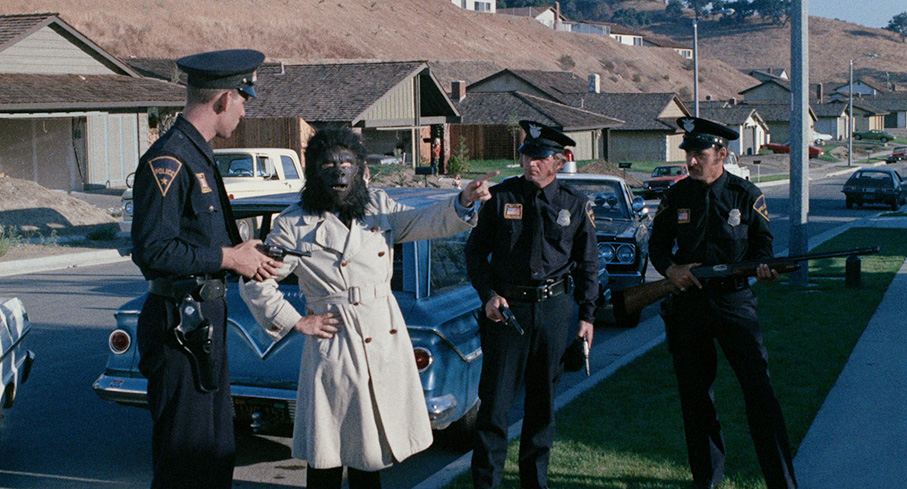
The mono 1.0 Linear PCM is clean and clear with the expected small restrictions on the dynamic range (slight treble bias, not much bass).
Optional English subtitles for the deaf and hearing impaired are on board.
Audio Commentary with John Landis and Rick Baker
Recorded for an earlier Anchor Bay DVD, this commentary track with writer-director-monkey-man John Landis and make-up effects wizard Rick Baker is an informative and consistently enjoyable treat. It's rarely screen-specific, but there are so many engaging stories about the making of the film that you'll have no complaint. The tale of how Landis met and hired Rick Baker is certainly entertaining (the young Baker was still living with his parents when the film was made and was interviewed by Landis and producer James C. O'Rourke in his bedroom), as is the news that he prepared the moulded parts for the Schlock suit by baking them in his mother's oven. We learn why Landis chose to play Schlock, that a ripped-off arm was actually a prop used in The Andromeda Strain, that Landis wrote the bulk of An American Werewolf in London when he was just 18, that he couldn't afford to wreck a car so rented one from Hertz and wrecked that instead, and a whole lot more. Landis also reveals that he was given money by producer Jack H. Harris to expand the film to distributable length, and that Harris did the same thing for another young directorial hopeful after Landis saw John Carpenter's first cut of Dark Star and suggested that Harris give that a look too. Although cheerful throughout, Landis continues to have sizeable issues with the film, which he claims at one point "kind of embarrasses me now" and "is impressive only for the balls that it shows." His funniest reaction, however, comes as the commentary draws to a close and he thanks us for buying the DVD. "What if they rented it?" asks Baker, to which Landis bellows furiously, "You fuckers! Don't rent this DVD, buy the fucking thing! Do you know how much this movie's cost me over the years?"
Schlock Defrosted (17:51)
Critic, horror writer and genre enthusiast Kim Newman provides a useful and typically well-informed overview of the film's merits, its role in the monster movie revival that followed and the influence of Mad Magazine and Joan Crawford's much maligned final film, Trog (a connection Landis freely acknowledges on the commentary track). He also notes that, "for all its foibles, Schlock is genuinely made with love." Amen.
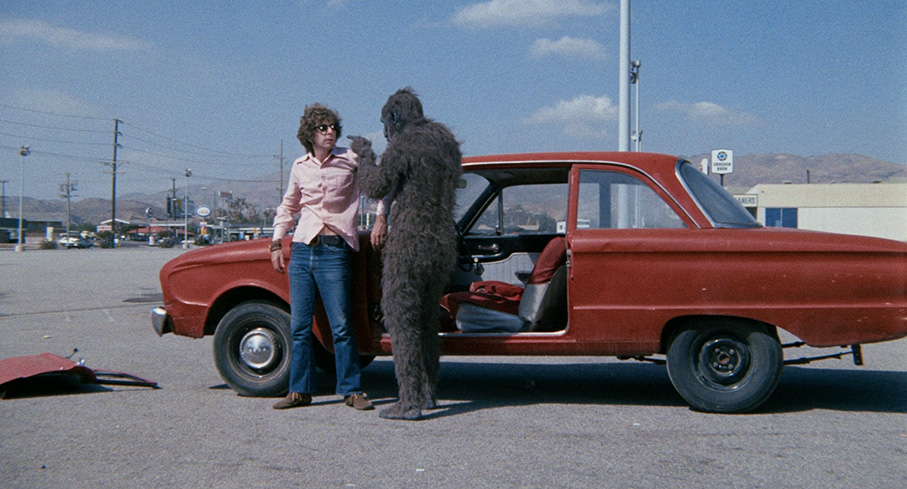
I Shot Schlock! (7:34)
An archive interview with four time Emmy Award-winning cinematographer Robert E. Collins, who also has a small role as a bartender in a rather good scene involving a blind jazz pianist. He recalls how he landed the job, his first meeting with the young John Landis, the heat during the shoot (this comes up in the commentary as well), the roles played in the film by himself and his two young children, and the peculiarity of watching Landis direct whilst still dressed in his Schlock suit.
Promotional Material
In this category we have three trailers and four radio spots, almost all of which are variations on the same theme. The 1972 Theatrical Trailer (1:34) sounds like it was narrated by the reporter in the film and includes its opening list of movies (including, of course, See You Next Wednesday) to which Schlock can be compared. The 1979 Theatrical Trailer (1:38) is almost identical but with a couple of minor changes and the up-front textual proclamation that this is "from the director of Animal House." I find it hard to believe that the 1982 "Banana Monster" Theatrical Trailer (1:31) wasn't made as a joke, but if it's somehow for real then it was put together by idiots. What we have here is essentially the 1979 trailer but with every mention of the word "Schlock" replaced with the words "Banana Monster," but in a voice different enough to that of the narrator to highlight the fact that it has been badly spliced in. The 3D drawn "Schlock" title graphic has also been replaced with 2D "Banana Monster" one that must have taken a first year art student all of five minutes to cobble together. Three of the radio spots draw on the trailer soundtracks, whilst the fourth consists of a cheerful conversation between a father and his young son and ends with the title being sung like the product in a cereal commercial.
Also included with the first pressing only is an Illustrated Collector's Booklet featuring new writing on the film by Joe Bob Briggs, but once again this was not supplied for review.
Some still find Schlock hilarious from start to finish and if that includes you or you have a par ticlar fondness for home-brewed silly humour, then you'll have nothing but love for this disc, which boasts a sparkling transfer and some excellent special features. If, like me, you find yourself groaning as often as you quietly snigger, there's still enough inventively silly material here to keep the funny bone intermittently tickled. Tricky to recommend wholeheartedly, but as Kim Newman says of the film itself, it was made with love.
|